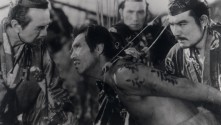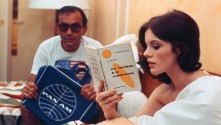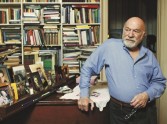
A World Viewed. Celebrating Stanley Cavell’s Life in Film
When preeminent philosopher Stanley Cavell (1926-2018) recently passed away, he left a legacy of lifelong devotion to cinema. During his tenure as Harvard’s Walter M. Cabot Professor of Aesthetics and the General Theory of Value, Cavell advocated for teaching and writing about film long before it was the norm. An avid cinephile and singular thinker of the medium, he also cofounded the Harvard Film Archive, ensuring that the Archive’s films would be available for viewing by students, researchers and the community into the foreseeable future. Of course, Cavell’s sense that cinema would and should play a vital, ongoing role in the “education of grown-ups”—his aspirational name for philosophy—was not limited to these indelible marks on Harvard. Over the next decades, his transformative insights into film would be made available to a far wider audience, as his books on film and philosophical questions, including The World Viewed: Reflections on the Ontology of Film (1971/79), Pursuits of Happiness: The Hollywood Comedy of Remarriage (1981), and Contesting Tears: The Hollywood Melodrama of the Unknown Woman (1996) became pathbreaking classics.
Honoring these contributions and more, Harvard’s Department of Art, Film, and Visual Studies and the Harvard Film Archive will co-host a symposium over March 27th and 28th featuring a series of distinguished speakers (see afvs.fas.harvard.edu for the full schedule). The symposium will also include this film series, revealing a fuller picture of Cavell’s cinematic tastes. Though his thinking and writing about cinema are often associated solely with studio-era Hollywood filmmaking, Cavell also addressed experimental and art cinemas. Excerpts of this work comprise the descriptions below and each hint at the prompts these films gave to the philosopher’s unfolding thought. Here, Chantal Akerman’s 2001 masterpiece La Captive explores the “vampirism” of love and photographic capture, Mizoguchi’s Ugetsu shows reality to be shot through with fantasy, Godard’s Two or Three Things I Know About Her poses questions through a musical fragment, and George Cukor’s Rich and Famous is reframed as a remarriage comedy about two women. As the symposium speakers will also explore, these remarks make clear the ways in which Cavell’s thinking about cinema has yet to be fully mined, with many inspirations lying in wait for those cinephiles whose lives are well-examined, and thus well-lived. – Kate Rennebohm, Visiting Lecturer on Art, Film, and Visual Studies, Harvard














